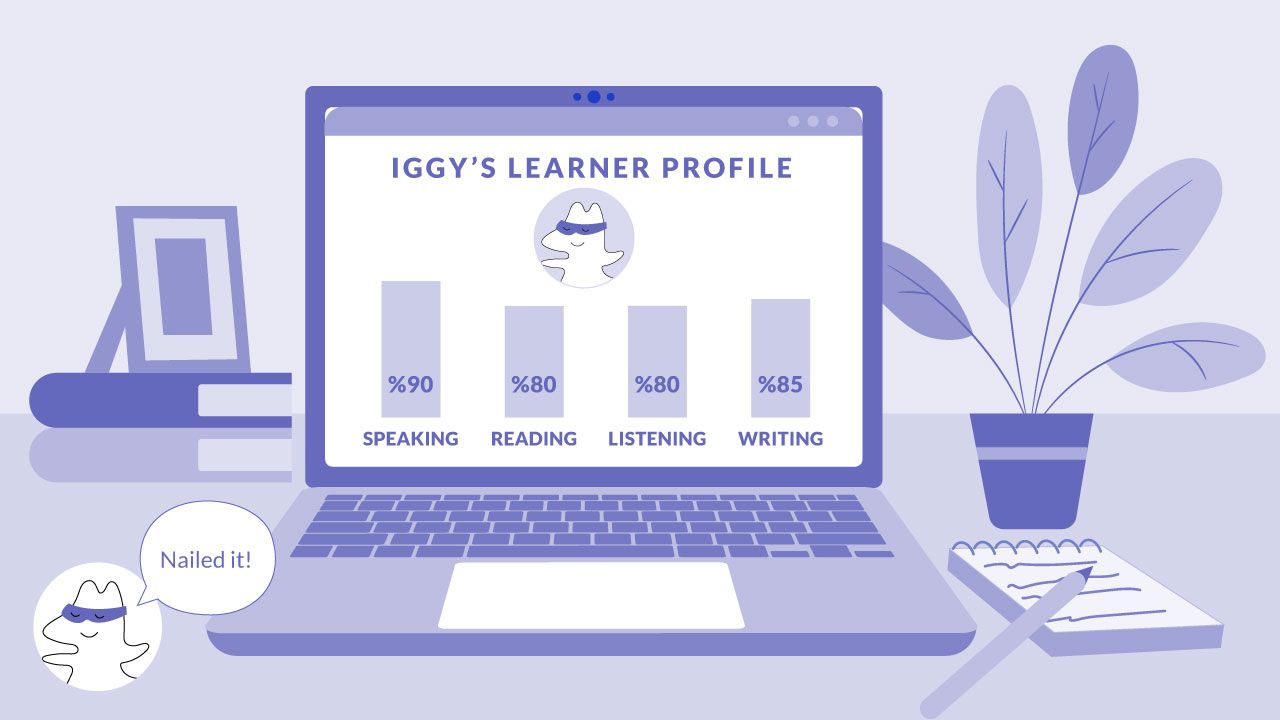
Writing is perhaps one of the toughest aspects of learning a foreign language to master. In order to write well, you need to get the hang of grammar, sentence structure, and punctuation, as well as have a strong vocabulary. And, on top of all that, you need to be able to organize your thoughts and express yourself clearly.
If that sounds like a lot, don't worry! We've created this concise guide to help you improve your English writing skills. By following the steps below, you'll be well on your way to becoming a confident and competent writer.
Learn English with Langster
Be Aware of Common Mistakes
One of the best ways to improve your writing is to be aware of the mistakes people – language learners and native speakers alike – tend to make. This can be tricky, as we all have different areas that we struggle with.
Still, there are some common errors many people make when writing in English. These include:
- mixing up tenses,
- misspellings,
- using too many filler words,
- not using linking words,
- misusing adjectives and adverbs.
Make sure to check out our separate post on the most common mistakes we all need to stop making. Once you learn to avoid them, your writing skills will already be much improved!
Practice, Practice, Practice!
The only way to get better at writing is to do it – a lot. The more you write, the more familiar you'll become with the different rules of English grammar and syntax. And, the more you practice, the easier it will be to put your thoughts into words correctly.
One great way to practice writing is to join an online writing community. Here, you can share your writing with other English learners, get feedback on your work, or even find a writing partner. You can also read and comment on other people's writing, which is a great way to broaden your horizons as a writer.
Find a Proofreader
Once you've written something, it can be helpful to have someone else read it over. This person can point out any errors or awkward, unnatural phrasings you may have missed. This is a very common occurrence for ESL learners, as they tend to translate some phases literally from their own language.
Ideally, you should find a native speaker or someone who is very proficient in English to proofread your work. But, if you don't have access to someone like that, a trusted friend or language exchange partner can also be of great help.

Read Regularly
Another tip for becoming a better writer is to make reading a regular habit. When you read, you expose yourself to different styles of writing and vocabulary. This can help you develop your own style and improve your use of grammar and punctuation. It's also a great way to find new topics that you're interested in writing about.
When reading, make sure to take some time to analyze writing you enjoy and admire. Are there any particular literary devices you like? Can you imitate your favorite authors in your own writing? Are there any other elements you’d like to incorporate in your writing? Try it!
So, make sure to set aside some time each day – or at least each week – to curl up with a good book!
Chose a Writing Style That Works for You
One of the best things about writing is that there are no hard-and-fast rules. As long as you're communicating your thoughts clearly, you can experiment with different formats and structures until you find one that feels natural and comfortable for you.
So, don't be afraid to mix things up! If you usually write in plain paragraphs, try incorporating bullet points in your writing. Or, if you're used to writing informally, try a more formal style. The important thing is to find a method of writing that works for you and helps you express yourself clearly.
Fiction Writing vs. Business Writing
Of course, the style of writing you use will also depend on the purpose or genre of your writing. For example, fiction writing is usually quite different from business writing. In general, fiction writing is more creative and expressive, while business writing is more straightforward and factual.
If you're not sure what style to use for a specific piece of writing, take a look at some examples to get an idea of what's expected. A quick Google search will turn up tons of examples of different types of writing, from blog posts to novels to business reports.

Outline!
Once you've decided on a topic and style, it can be helpful to create an outline of your piece before you start writing. This will give you a roadmap to follow and help keep your thoughts organized. An outline doesn't have to be long or complicated – a few bullet points will do. It can be very helpful, especially for longer pieces of writing.
If you need help getting started, try looking for a writing prompt or template to use. This can be especially helpful when you're writing something like a cover letter, essay, or formal email, where there is a specific format that you need to follow.
Format and Edit Your Own Writing
Once you've written your piece, it's important to take some time to format and edit it. This is where you'll make sure that your writing is clear and easy to read. You'll also check for any grammar or spelling mistakes and make sure that your work is properly formatted.
If you're not sure how to format your work, take a look at some examples of similar pieces of writing. For example, if you're writing a business report, take a look at some other business reports to use as a reference. Or, if you're writing an essay, look at some sample essays to get an idea of how they're usually formatted.
Editing and proofreading can be a bit tedious, but it's important to take the time to do it. A well-edited piece of writing will be much easier to read and understand, and it will make a better impression on your reader. You can use tools like Grammarly to make this process easier and even learn a thing or two!
If you're not sure where to start, try reading your work out loud. This can help you catch errors that you might not otherwise notice. You can also print your work, and go through it sentence by sentence. This can help you catch even more mistakes!
Finally, don't forget to ask someone else to read your work before you publish or submit it. A fresh pair of eyes can often spot errors that you've missed.
Writer's Block
Writer's block is a common problem, especially for beginning writers. If you're feeling stuck, don't worry – you're not alone. There are a few things you can do to get unstuck and start writing again.
First, try taking a break from your work. Sometimes all you need is a little time away from your piece to clear your head and come back with fresh ideas. Go for a walk, take a nap, or just step away from your desk for a few minutes.
Another helpful trick is to try writing in a different location. If you usually write at home, try going to a coffee shop or the library. Sometimes a change of scenery can help jumpstart your creativity.
If you're still having trouble, try brainstorming with a friend or fellow writer – it can be helpful to talk through your ideas with someone else. Brainstorming can also help you come up with new ideas and approaches to your writing.
No matter what, don't give up! Everyone gets stuck sometimes – even the best writers. The important thing is to keep writing. With a little persistence and creativity, you'll get through your writer's block and back to your writing in no time.

Accept That First Drafts Are Always Horrible
One last piece of advice: don't expect your first draft to be perfect. It almost certainly won't be, and that's okay! Everyone's first drafts are terrible. The important thing is to get your thoughts down on paper (or screen) and to keep writing, even if it's not very good. You will revise, edit, and rewrite your text later – it’s not illegal.
Remember, the goal is to improve writing skills, not to produce a work of art. So, don't be too hard on yourself, and keep writing!
Keep a Positive Attitude
Becoming a better writer takes time, effort, and – most importantly – practice. Don't get discouraged if your first few attempts aren’t perfect. Just keep at it, and soon you'll see yourself making progress.
Writing well in any language is a skill that can be learned, so stay positive and keep at it!
The Bottom Line

If you want to improve your writing skills in English effectively, you need to approach it comprehensively. The first step is to be aware of common mistakes people make when writing in English. Other than that, make sure to write as often as possible, and get feedback from a trusted friend or instructor. Practice makes perfect!
Next, focus on finding a writing style that works for you. Experiment with different formats and structures until you find one that feels natural and comfortable. And, finally, stay positive! Becoming a better writer takes time and effort, but the rewards are worth it. Good luck!









